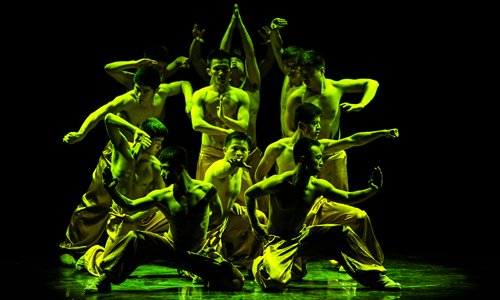Kung fu theater
Lack of story hurting martial arts performances in China

Performers stage a scene from play Kung Fu Poetry in Zhengzhou, Henan Province in March. Photo: CFP
Bringing a Jackie Chan or Bruce Lee movie to the stage as a live performance can be a very tempting idea for production companies. However, actually making such a production a reality may be far more difficult than producers ever imagined.
Over the past few years, all kinds of action dramas have been produced all over China. Local governments, martial arts training schools, as well as production companies have all made attempts to bring audiences into theaters for some kung fu action.
This trend continued this year, as a number of performances hit stages during the first half of 2015.
Martial Arts, Legendary, a co-production by the Jingwu County government in Tianjing and the Huo Yuanjia Civil and Military School, presents the 4,000-year history of Chinese martial arts and the life story of martial artist Huo Yuanjia.
Eleven Martial Artists, created by the Chinese Dragon Martial Arts Troupe, combines elements of ballet, modern dance and drama as well as a video montage to recreate the life of Bruce Lee.
The Guangzhou Drama Art Center and Huaman Brother's Messy Temple is an adaptation of the comic book series of the same name. The series has already been adapted into several movies that were all well received at the box office.
These action dramas keep up the excitement by presenting intense fighting scenes featuring dangerous acrobatics. Many of the shows begin and end with a fight. Sometimes the fighting can even go on for 20 minutes to a half an hour.
Performers are mostly from martial arts training schools. However, although the martial arts sections of such shows can sometimes match the brilliance seen in blockbuster martial arts films, these performances have had a hard time staying popular enough to convince investors to pour more money into them.
Last weekend, South Korean martial art show Jump was held at the Poly Theater in Beijing. The performance will also be heading out on a broader China tour this summer. Originally called Crazy Family, the show premiered at the National Theater of Korea in 2002 and has been performed in over 40 cities around the world to date.
Cara Han, the producer of Jump, told the Global Times in an e-mail interview that she feels the reason that many of China's action dramas fail to achieve expected results may be due to "the story not fitting the martial arts genre or vice versa, or the fact that some performances focus mainly on martial arts which eventually bores the audience.
"I believe that although Jump is a non-verbal performance, it has been able to succeed internationally due to the fact that it contains a well thought out story along with presenting the qualities of individual characters. Jump also represents Asia's martial arts working side-by-side with slapstick comedy. It is also to my belief that another reason for its success is that the different martial arts used by the family helps keep the audience interested."
For Han, Jump was "planned and made with no thought to separating Eastern and Western audiences." The success of Jump may offer an example for production companies in China that seek to take their action shows overseas. Presenting the concepts behind marital arts in a simple way that can bypass language barriers is probably the way to go instead of spending time boring audiences by trying to explain concepts such as yin-yang to audiences.